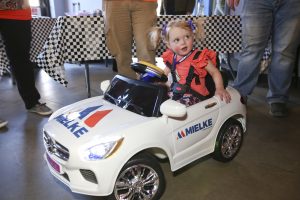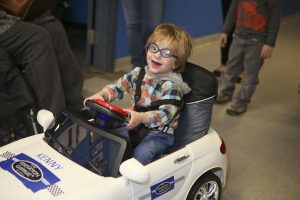The Need for Mobility
Independent mobility is linked to cognitive, social, motor, language and social-emotional development. From 6 months to 3 years of age, children with typical development move toward people or things of interest, learning from their environment and forming important neurological pathways. However, between 6 and 9 percent of children under the age of 16 have impairments that restrict mobility. By reducing the barriers to independence through assistive technologies, the Inclusioneers collaboration of partners can augment physical capabilities and optimize participation in play or leisure activities for age-appropriate development.
The Adapt-A-Car Project Objective
In general, the Inclusioneers Adapt-A-Car is designed to promote mobility in young children through a unique multidisciplinary approach. Together with families, health and social service agencies, medical professionals, engineering students and mentor engineers, the Adapt-A-Car program develops low-cost, high-impact technologies with battery-powered, ride-on cars for children and young adults, to help people of all abilities engage in their community programs and enjoy and benefit from their natural learning environment.
The Adapt-A-Car Project Description
The Adapt-A-Car program involves mechanical and electrical adaptations to off-the-shelf power wheel toys designed for typical children ages 1-6 years old. Ride-on cars are modified by Engineering students, business mentor engineers and clinicians, to account for the unique mobility requirements of children with developmental disabilities. The recipients are evaluated by medical and social care-giver professionals to develop age appropriate strategies for adaptations to toy cars that augment a child’s natural abilities to impact early mobility and overall childhood development.
Typical Adapt-A-Car modifications address the special needs of children that lack upper or lower muscle strength, dexterity, cognitive development, as well as, children that require addition posture/seating support, or special consideration for medical equipment (i.e. breathing apparatus, communicators etc.) that must travel along with the child.


The Adapt-A-Car as a Developmental Tool
Following the research of Cole Galloway, PT, PhD in the Department of Physical Therapy at the University of Delaware, toy ride-on cars can be adapted to improve the odds for kids whose mental, social and emotional development is delayed because of their physical inability to explore their environment. The Inclusioneers Adapt-A-Car program relies heavily on Dr. Galloway’s research that Ride-On cars can be modified to have a therapeutic value, providing mobility to children who can’t crawl or walk, empowering them to be a part of the action at home, in the daycare, or on the playground.
